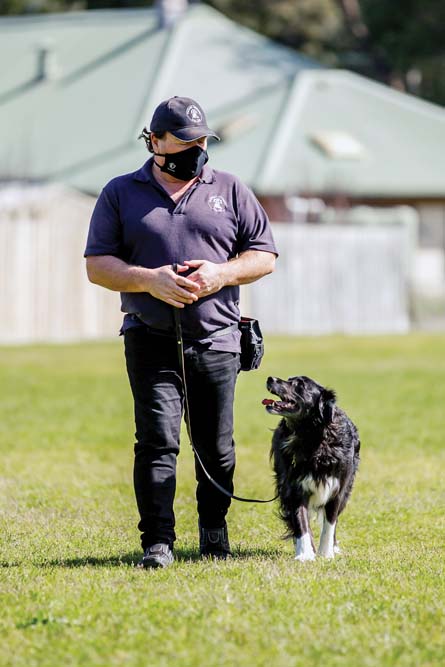By David Forster

TIMES are difficult for dog lovers who have been attending the Peninsula Dog Obedience Club at Quinns Park, Burdett Street, Tootgarook.
The club, with 300 members, used to be a hive of activity, with members gathering on Wednesday and Sunday mornings for a chat, a cuppa and dog training.
Over the years close relationships have built up within the club which is focused on caring for one another. Some dog clubs have a competitive feel and the status of your dog and their breed becomes top of mind.
COVID-19 has affected the club dramatically, with live training sessions being cancelled since March.
Fortunately, dogs are not required to wear masks while training.
Online meetings are being held to assist members, particularly those with puppies and in the beginners’ class.
Revenue is down and the club is run by volunteers and a team of skilled instructors.
Normally the club has six classes from puppies through to section five for the smartest dogs and their handlers.
Some club members are dedicated to training and learning skills such as trialing, tracking and disability support.
It is enjoyable watching different dog breeds being trained.
The club has a newsletter, and an active Facebook page for members.
Members win ribbons when their dogs perform at event days when animal spirits also seem to rise.
Many dogs seem happy during the COVID-19 restrictions as owners are either working at home, off work, or jobless and can regularly turn to the dog for cuddles, licks and wagging tails. Less time is wasted on the commute but, if you are out of work and feeling depressed, maybe the dog is also feeling depressed.
Some owners may fear going outside the home due to the risk of COVID-19 and the dog could be pining away from lack of exercise and other dogs to talk to.
Club president Ken Thomas says his two border collies, Abby and Jaxx, are sometimes “difficult” and he does not expect training to resume before November.
He is worried that the COVID-caused puppy craze will lead to serious behavioural issues for many owners.
“My biggest concern is that without training days some owners will suffer anguish and despair,” Mr Thomas said.
“Some dogs and their owners miss the discipline of training. Dogs will adopt bad habits, such as jumping up on owners, constantly barking, whining, scratching doors and anti-social behaviour.”
He says being locked up and having restricted exercise will impact on dog behaviour.
Mr Thomas worries that some club members who are elderly, isolated and live alone are likely to have increased mental issues during the COVID crisis.
Members often turn to one another for advice when their dog is misbehaving, and that advice is missing when the club is in hibernation.
Margaret Brain joined the club about 33 years ago. She is a committee member and the longest serving member.
“For some owners, the long break from classes will mean handlers may have to go back to basics,” she said. “Dogs have to know you’re the boss and you won’t let your dog do whatever it wants.”
When asked how younger members have changed over the years Ms Brain said: “The younger people seem more self-contained. They seem to care in a different way than we do.”
First published in the Southern Peninsula News – 1 September 2020